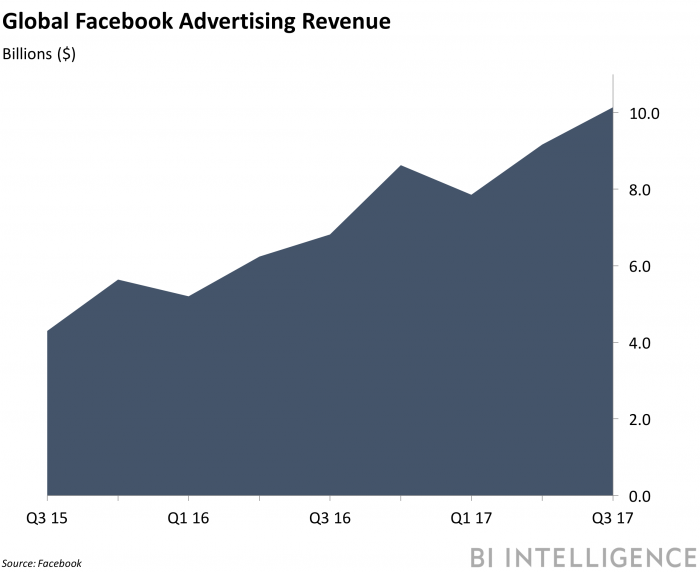Discriminatory ads slip past Facebook's filters (FB)

BI Intelligence
This story was delivered to BI Intelligence "Digital Media Briefing" subscribers. To learn more and subscribe, please click here.
Facebook is still allowing advertisers post housing ads that exclude people based on race or disability, ProPublica reports. Discriminatory ads in relation to housing, credit, and employment are illegal under the federal Fair Housing Act.
ProPublica was able to purchase housing ads on Facebook that excluded Asian Americans, African Americans, and people interested in wheelchair ramps. Facebook’s flagging system should have prevented these ads from posting, though every ad ProPublica purchased was approved in minutes.
ProPublica’s findings signal Facebook’s shortcomings in enforcing the safeguards it implemented in February to prohibit discriminatory housing ads. ProPublica published a report in 2016 that similarly found advertisers could buy discriminatory ads on Facebook. As a result, Facebook implemented measures including tools to detect and disable the use of discriminatory ads, but it’s clear those measures did not solve the problem.
Here are some key reasons ProPublica’s findings are troubling for Facebook:
It shows Facebook’s safeguards for protecting users from discrimination are insufficient. This is troubling as over 25% of the global population uses Facebook on a monthly basis. With such a global presence, Facebook has become a social good and therefore has a moral obligation to protect it's extremely diverse users.
It shows Facebook is facing issues enforcing its own policies. Facebook promoted a story in October that incorrectly identified the suspect in the Las Vegas mass shooting, despite the company outlining a number of projects it would launch to fight fake news. Additionally, Facebook found Russian-linked accounts bought nearly 3,000 advertisements that included divisive political, racial, and fake news posts, despite its policy to block ads from pages that repeatedly share fake news.
It signals a greater need for human reviewers of Facebook ads. The company will likely continue to increase the number of human reviewers it employs to vet ads. This would decrease the chances of a discriminatory ad falling through the cracks when Facebook’s automation systems fail. This approach would mirror Facebook’s effort to fight fake news, as it has increasingly leaned on human-fact checkers to compliment the company’s machine learning technology.
It could hurt Facebook’s goal of making Marketplace a go-to destination for housing searches. Housing providers now have more opportunities to advertise on Facebook, as the company recently added rental listings from Zumper and Apartment List to Marketplace. ProPublica’s findings may make some Facebook users fear being excluded from certain housing listings in Marketplace, which could cause these users to prioritize other housing listing platforms.
Facebook’s ad-targeting gaffe brings to light the potential dangers of allowing discriminatory ads on its platform. Players in the credit industry could use these discriminatory ads to exclude certain users from being excluded from certain credit opportunities, leaving groups of users at a disadvantage in securing financing. Additionally, prospective employers would be able to use discriminatory ads to exclude certain users from job opportunities. In taking steps to address ProPublica’s findings, Facebook may lower the chances of these types of instances affecting its users.
Nonetheless, Facebook plans to take steps to ensure discriminatory ads don’t show up on the platform. The company will require all advertisers to confirm they are compliant with anti-discrimination laws, in a statement emailed to ProPublica. This tactic shifts the burden of proof onto advertisers. However, Facebook needs to improve their own processes and technology to ensure that compliance with anti-discriminatory is straightforward.
The Digital Trust Report, a brand new report from BI Intelligence, examines consumers’ perception of major social platforms. It rates Facebook, YouTube, Instagram, Twitter, Snapchat, and LinkedIn on security, community, user experience, and content authenticity and shareability. These insights help brands and marketers make informed decisions about where to spend their marketing and branding dollars.
All of the information in this survey comes from our proprietary BI Insiders panel, made up of more than 15,000 specially selected and recruited Business Insider readers. This panel is designed to be a leading indicator of what’s next in digital. The panelists are business and tech savvy, they have buying power, and they’re highly engaged. The survey revealed some fascinating insights into how millennials and decision makers view today’s most popular social media platforms.
Here are some key takeaways from the report:
Digital trust has been shaken by a proliferation of malicious content and data breaches, which has significant consequences for brands that use these platforms.
The top platform won by a huge margin on most attributes. Content on this platform is more likely to be viewed as forthright and honest, which increases the persuasiveness of ads and marketing messages that appear alongside it. This also creates ideal conditions for thought leadership and branded and sponsored content to flourish.
The second-ranked platform was bolstered by users' confidence sharing content they find there. Users were most apt to share content they found there, which, together with its massive audience and high engagement, makes it the right platform to maximize reach.
The social platform that finished dead last did so because of its abusive comments section and extremely annoying ads. Still, this hasn’t dissuaded people from visiting, as evidenced by the time spent monthly and massive user base. This platform also resonates more with older generations.
The Digital Trust Report is only available with a subscription to BI Intelligence, Business Insider's premium research service. To access this report, plus hundreds of other deep dives into the future of digital, click here.
See Also:

 Yahoo News
Yahoo News 

